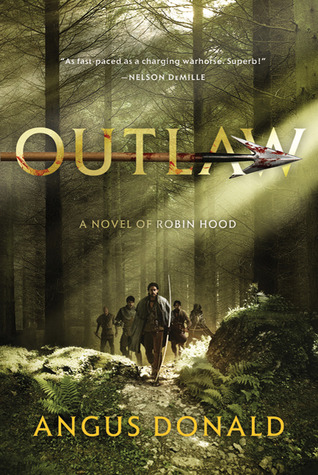
by fljustice | Mar 31, 2011 | Books, Fiction, Free stuff, Reviews
“Outlaw” by Angus Donald
As a kid, I fell in love with Robin Hood. Errol Flynn swashbuckling through the forest all clean and pretty. The collected stories I read over and over again. The 50’s TV show (written by blackballed Hollywood writers with a decided anti-McCarthyism bent) with the stirring theme song:
Robin Hood, Robin Hood
Riding through the glen.
Robin Hood, Robin Hood
With his band of men.
Feared by the bad, loved by the good.
Robin Hood, Robin Hood, Robin Hood.
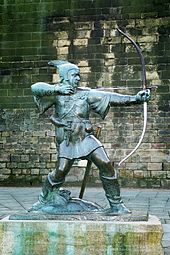
Robin Hood Memorial at Nottingham by James Woodford
Okay, it’s more stirring with the music. (You can listen here.) Growing up, the legend of Robin Hood was everywhere as the ultimate hero who stood up for the little guy against evil oppressors: corrupt sheriffs and greedy churchmen. We all knew the stories of loyal Little John, the strong right hand man; tipsy Friar Tuck; Will Scarlet, handy with a sword; Alan A-Dale the minstrel; and the chaste, beautiful and smart Maid Marian, Robin’s enduring love. After stirring adventures, good King Richard arrives in time to pardon the outlaws, give them lands and titles and join Robin and Marian in marriage.
It’s an iconic tale of good vs. evil and happily-ever-afters that attracts artists back to the theme over and over. Numerous books have updated the story or tinkered with the timelines. Directors have put their own stamp on the story from the Mel Brooks’satirical “Men in Tights” to the most recent Ridley Scott entry, where yeoman Robin is responsible for the Magna Carta. It’s very hard to bring something new or fresh to the story.
(more…)

by fljustice | Mar 20, 2011 | Books, Fiction, Free stuff, Interviews
Author Interview: Melanie McDonald
It’s been way too long since I posted an author interview on this blog, but finally found a great candidate. Melanie McDonald just published an acclaimed new literary historical novel Eronemos about Emperor Hadrian’s doomed young lover Antinous. From the back:
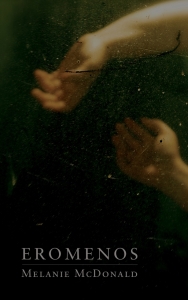 “Eros and Thanatos converge in this story of a glorious youth, an untimely death, and an imperial love affair that gives rise to the last pagan god of antiquity, Antinous.
“Eros and Thanatos converge in this story of a glorious youth, an untimely death, and an imperial love affair that gives rise to the last pagan god of antiquity, Antinous.
In this coming-of-age novel set in second century Rome, the Greek youth Antinous of Bithynia recounts his seven-year affair with Hadrian, the fourteenth Roman emperor. In a partnership more intimate than Hadrian’s political marriage, Antinous captivates the most powerful ruler on the earth.
This version of the story of the emperor and his beloved ephebe envisions the life of the youth who after death achieved apotheosis as a pagan god whose cult of worship lasted for hundreds of years, and gives voice to Antinous, whose image still appears in museums around the world.”
Ms. McDonald not only agreed to an interview, but provided a signed copy as a giveaway (details at the end of the post.)
Faith L. Justice: I’m sure two of the first questions readers have for you is, “How do you pronounce the title?” and “What does it mean?” (more…)
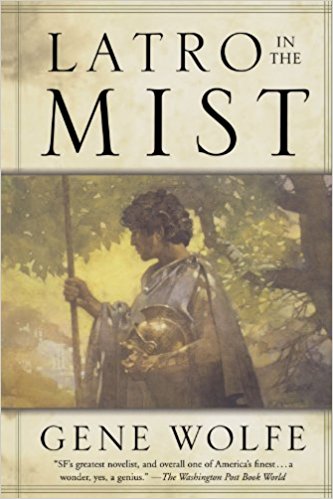
by fljustice | Feb 24, 2011 | Books, Fiction, Reviews
“Latro in the Mist” by Gene Wolfe
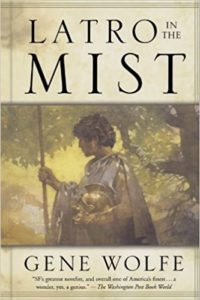 I occasionally run across a book that challenges me; that makes me work for the story and enjoy the labor; that awes me with the craft of the writing. Usually these are considered “literary novels.” I also find a lot of literary novels tedious, because I’m partial to plot-driven stories. But Latro in the Mist surprised me. It’s a fantasy novel with gods and ghosts (which may not be real, see my discussion below.) It’s a historical novel about real events set in Greece in 479 B.C., and populated with historic characters. It’s also a finely crafted literary novel that makes the reader think beyond the story and characters about the nature of memory and self, friendship and loyalty, and the journey that is life. (more…)
I occasionally run across a book that challenges me; that makes me work for the story and enjoy the labor; that awes me with the craft of the writing. Usually these are considered “literary novels.” I also find a lot of literary novels tedious, because I’m partial to plot-driven stories. But Latro in the Mist surprised me. It’s a fantasy novel with gods and ghosts (which may not be real, see my discussion below.) It’s a historical novel about real events set in Greece in 479 B.C., and populated with historic characters. It’s also a finely crafted literary novel that makes the reader think beyond the story and characters about the nature of memory and self, friendship and loyalty, and the journey that is life. (more…)
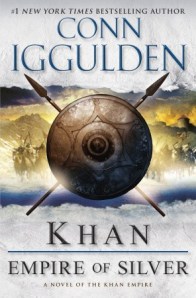
by fljustice | Jan 4, 2011 | Books, Fiction, Reviews
“Khan: Empire of Silver” by Conn Iggulden
From the Synopsis:
“Genghis Khan is dead, but his legend and his legacy live on. His son Ogedai has built a white city on a great plain and made a capital for the new nation. Now the armies have gathered to see which of Genghis’ sons has the strength to be khan. The Mongol empire has been at peace for two years, but whoever survives will face the formidable might of their great enemy, China’s Song dynasty.”
 Conn Iggulden (author of the Emperor series on the life of Julius Caesar) brings us the fourth in his Conqueror series covering the history of the Mongols. The book begins with a very unhorde-like activity…building a city. But quickly moves into palace intrigues as Genghis’ heir, the ailing Ogedai, moves to thwart his brother’s attempt to assassinate him and take over the assembled nation. From there, Iggulden takes us on a roaring ride—all battles, military strategy, and new weapons (including proto-cannons)—lots of blood, death, and unimaginable destruction. Not having lived in or studied this time period, I couldn’t say if it accurately reflects the thinking of the time, but it felt visceral and grounded in the known facts. Iggulden makes good use of everyday details from food, drink, clothes, geography and shamanism to build a world and give us access to it. (more…)
Conn Iggulden (author of the Emperor series on the life of Julius Caesar) brings us the fourth in his Conqueror series covering the history of the Mongols. The book begins with a very unhorde-like activity…building a city. But quickly moves into palace intrigues as Genghis’ heir, the ailing Ogedai, moves to thwart his brother’s attempt to assassinate him and take over the assembled nation. From there, Iggulden takes us on a roaring ride—all battles, military strategy, and new weapons (including proto-cannons)—lots of blood, death, and unimaginable destruction. Not having lived in or studied this time period, I couldn’t say if it accurately reflects the thinking of the time, but it felt visceral and grounded in the known facts. Iggulden makes good use of everyday details from food, drink, clothes, geography and shamanism to build a world and give us access to it. (more…)
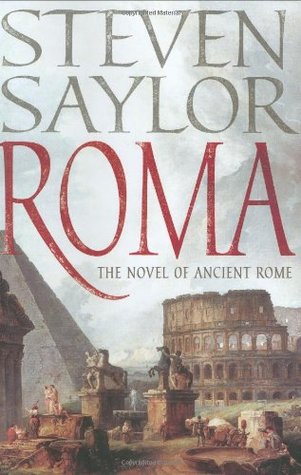
by Faith Justice | Sep 12, 2010 | Books, Fiction, Reviews
“Roma: The Novel of Ancient Rome” by Steven Saylor
Over three thousand years ago, a murder takes place on an island in a river flowing through the hilly region of Italy later known as the ruma. This bloody act presages the rise of one of the ancient world’s most ruthless empires. In Roma: The Novel of Ancient Rome, Steven Saylor takes us on a thousand-year journey from Rome’s mythical beginnings as a trading post for salt sellers through its evolution into an empire, in a style reminiscent of James Michener. Along the way we witness Hercules‘ destruction of the monster Cacus; the founding of the walled city of Rome by a couple of young bandits named Romulus and Remus; the abduction of the Sabine women; invasions by enemies; and revolutions by generals, plebeians and slaves. Throughout, Saylor provides us with real people and understandable motivations, whose stories have been transformed over time into the stuff of myth and legend. (more…)







